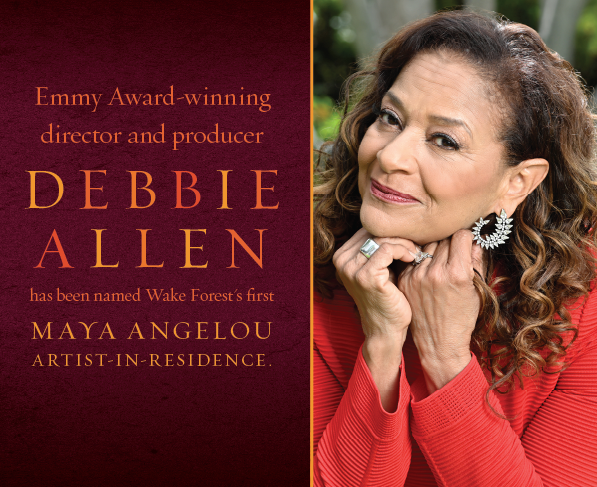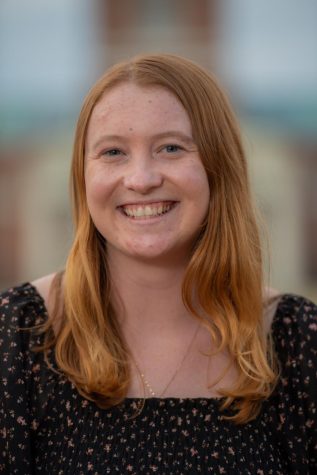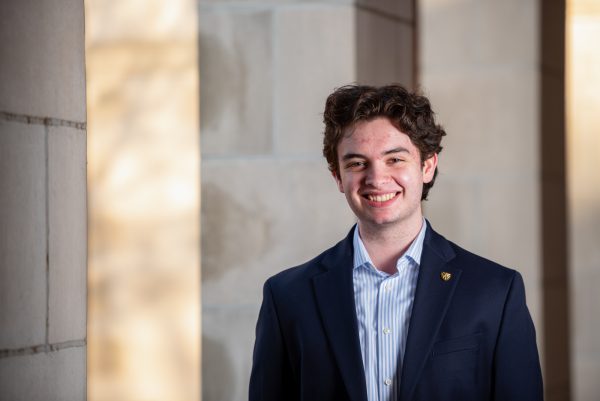Wake Forest welcomed Debbie Allen to campus this week to receive the inaugural Maya Angelou Artist-in-Residence Award. The award honors accomplished artists who reflect Angelou’s commitment to creating, performing, teaching and striving to improve the lives of others.
Allen is an Emmy award-winning director and producer perhaps best known for her roles as Lydia Grant in the musical-drama television series “Fame” (1982–1987) and Dr. Catherine Avery in the ABC medical drama “Grey’s Anatomy.” These days, Allen is teaching at her own dance academy in Los Angeles and continuing to work as a director and producer.
Arts & Culture Editor James Watson and Editor-in-Chief Christa Dutton spoke with Allen during her visit to campus. Allen shared how she’s being inspired by young people to create change — change that must be fueled by the arts and storytelling.
James Watson: In a lot of ways, your legacy is now intrinsically tied to Maya Angelou, but also Wake Forest’s. Like Maya Angelou, what are some lasting impressions that you would like to make on this place?
Debbie Allen: We’re trying to do something that opens. She was all about inclusion, diversity. It was what she worked so hard for, and it was part of our relationship. When I was rejected by the North Carolina School of the Arts, she found out about that, and she joined the board to make sure that it never happened again. It’s a different place now. Yesterday, I met the [UNCSA] Provost, and they’ve offered me to come and do an opera there — and I think I’m gonna do it.
What can we do here with your students? I taught a class today, and they were all ballerinas. It was good because I was not teaching a ballet class, but it was very technical, and I pushed them. It’s just about opening a conversation through the arts, and that can help people start to see themselves differently.
Christa Dutton: I think you’re doing a lot of that in your career now with your dance academy. Tell us more about your teaching and why that work is so meaningful.
DA: I’m always teaching because I think knowledge is part of the creative process — understanding what you’re doing, and where it’s coming from.
I took my daughter away to dance with the Kirov Academy, and she was one of two Black students. I was very proud that she was there, and she was getting something I never had an opportunity to have when I was her age. One day, the teacher basically insulted her in front of the class. I said, come home, we’re starting a school here.
She’s been my muse for a long time, and I have created many of my productions at the Kennedy Center around her. That was the beginning. She was the inspiration — as well as Rick Carter, the production designer for “Amistad” and “Lincoln,” who kept saying to me, “Why are you waiting for permission to do this dance school when you know you need to do it?” I said, “Okay, I’m gonna do it.” Now it’s 23 years later. We have young people that we have developed that are starring on their own Netflix series, choreographers, dancers, people in business doing nonprofits. I know we’re making the world a better place.
JW: Stepping back in time a little bit to the show, “A Different World.” It was such a boundary-breaking show for the way it engaged with challenging subjects. There are laws going on the books in states to prevent talking about gender and sexuality in both governments and schools as well as school boards banning books for the ways they tackle race. A lot of people feel like we’re regressing. Do you think that “A Different World” could be received by an audience today? Could they take what you’re saying and really engage with it more than they could have back then?
DA: We had a huge following then, and it wasn’t just Black kids. Everybody was watching it, and it made everybody want to go to college. I think now is a great time for it to have a reboot. The episodes that we did 15 years ago are still relevant now. We did the first episode about AIDS. We did one about satirizing the presidential campaign. And we made them women that were running, and it was funny, it was “Jill Blinton,” instead of Bill Clinton.
I was always in trouble. When I say trouble, I was always being called in by the network. “Why are you doing this?” And I was like, if young people on campus are quiet, the nation is dead. Dead. So “A Different World” is significant and relevant and couldn’t be more timely than it is right now. So I’m actually working on it.
JW: Is there anyone that you think is doing similar work in the field and trying to engage audiences in a similar way currently?
DA: A show that I really like is “Yellowstone.” The stories they are portraying are about Native Americans and how they’ve been mistreated by the church, and these are true stories. I’m looking forward to seeing [Martin] Scorsese’s new movie [“Killers of the Flower Moon”]. And [Chistopher Nolan’s] “Oppenheimer,” you know, because here we are with the nuclear threat right now.
I asked [former] President George Bush when I was his cultural ambassador of dance, “Do you think that the situation in the Middle East could put us to the third World War?” And then Sept. 11 happened. Here we are now on the cusp of more horror. It’s a nightmare — however you look at it. We need art. I’m counting on young people right now. I’m counting on you all to make the election what it needs to be. I’m counting on you not to be quiet. I’m counting on you to stand up to the NRA (National Rifle Association). We’ve been trying, but it’s on you guys to get rid of some of these people that have been elected. They gotta go.
JW: Well, let me ask you then because activism has been such an important part of your art for so long, especially with gun violence. How is it that you stay encouraged and motivated when you’re running up against systems that are not designed to change?
DA: Last night, I was watching this documentary about the toys that made America, and they’re talking about all these innovative toys like Barbie. They thought nobody was going to buy a doll with breasts, but she stuck with it — you have to stick with things. You have to know that you have a purpose. “Amistad” took me 18 years to get done. I never gave up, and that’s why it got done.
What is this chaos that’s going on right now in Washington [D.C.]? Talk about draining the swamp — it’s beyond a swamp right now. Young people have got to own this country. Speak up. Everybody better vote. You must. It is the power that we have, and they are trying to change that, too. You have to believe in something.
CD: What role do you think modern storytelling can play in that? I’m particularly interested in your work on “Grey’s Anatomy,” because I think most Wake Forest students probably know you best from your work on that. How do you bring fresh and new ideas to the show that’s run for so long?
DA: Storytelling is really not new, it’s just about who. Any story or show that’s really successful has all of these different worlds that can live on. At the end of the day, it’s about people, right? People, love, loyalty, betrayal, truth, speaking truth to power, asking who’s in charge — those are the things that are important in every show. Think about it. Storytelling is about people. And that’s what’s important.
We’re in a hospital, which makes it very interesting because we’re dealing with cutting edge, real medical situations. We did a whole season about COVID. At first, the head writer at the time was like, “I’m not gonna deal with COVID.” I was like, “really?” Then she thought about it and turned around. It was one of the best seasons we ever had. Meredith [Gray] went into a coma. We didn’t know she was going to wake up. You never know. Storytelling in the arts is for us to address all these things. It’s for the artists to do it — unencumbered and unfiltered.
JW: Has your working on “Grey’s Anatomy” sort of informed your medical activism or vice versa?
DA: It has. I pretend to be a doctor, but the medical profession is something I’m close to. My dad was a dentist, so I was always around it. I knew how hard he worked, and now even after many years, he would go to seminars to get updated on what was new. You have to stay current. That’s where the whole A.I. thing comes in — everybody has to just get ready. It’s not going away. You’ve got to figure out how to use it. How do you control it? How do you use it? So we don’t end up being “Terminator” where the machines are taking over and telling us what to do. These are real concerns.
CD: Tell us about that experience moving to New York after graduation. What were you feeling, and what advice would you give students moving to pursue the arts?
DA: It was so exciting to go to New York. It was scary. I grew up in Houston, Texas, which is a big Metropolitan country town — wide open spaces and floods and hurricanes. And I just had never seen buildings so close together, living like that. It was new. My first trip to Broadway — [it] was pretty amazing to see a Broadway show. I knew I wanted to be a part of that world. You set your sights on where it is you want to go, and then you gotta go there. Find your way. That’s what I did.
Sometimes my sister and I had a can of tuna fish to eat between us and our two cats. Sometimes we got to have some chicken. Sometimes we just better drink soda. We’d lie to our parents and tell them we were doing so good. But you know, you got to stick it out. New York was a lesson in what it is to be in the world. I encourage any young person that has these kind of aspirations to go because it’s different from Hollywood. In Hollywood, you can’t get on the lot. In New York, you could gangster your way into an audition. If you have the right smile and the right personality, you might be able to get in the building. You can’t even get on the lot if your name isn’t out there. It’s a different thing. New York is grassroots in a way that’s really cool.
JW: I think perfectionism and a fear of not being enough weighs fairly heavily, especially on college students because it’s such a transitory period in our lives. What do you have to say about perfectionism? And how do you hold yourself to a higher standard while staving off burnout?
DA: The truth is you’re never going to be perfect. I remember Uta Hagen told me one day in class, “That was perfect, Debbie” and I never went back to class because I felt like I learned what she had taught me. I didn’t need to sit there. You can always do it better. That’s the truth.
JW: So then how do you weigh being able to be in the moment against the relative precision of performance?
DA: The truth is that it’s in the moment. If you’re in a theater, whatever you do that night, that’s it. Tomorrow night, you get another chance. When you’re doing a film, you might get to do two takes depending on who your director is. If it’s Tyler Perry, you better get it right on the first day. If you’re working with Viola Davis, she doesn’t want to do it more than once. Neither does Denzel Washington. If you come in there lurking, you’re going to end up on the floor. What I’m saying is I don’t try to weigh everything against everything. I stay in the present moment.
I’m doing so many things right now. I’m doing “Grey’s Anatomy,” which is where I got to go after I leave talking to you. I have to go to a production meeting because the strike is over, and now they need my opinion. Mariah Carey, that’s who I was talking to when I walked in the door. I’m her creative director. She’s opening at the Hollywood Bowl on Friday, and there’s a problem with a set piece. In the middle of all that, I have to go to Nutcracker rehearsals this weekend. I’m here because this was important to take a moment in recognition of who Maya Angelou is; that’s why it’s important. It’s not about me, it’s really about her — who she is, who she is to me and who she is to the community. And I will always say is not was, because she is.
JW: Being a Black woman in this industry, in regards to the future, are there signs that the field is becoming more equitable and diverse in meaningful ways? If so, what encourages you or what discourages you?
DA: I’m totally encouraged because when I came, there was no one that looked like me anywhere. I was always the only one in the room. Everywhere — in “Fame,” the Oscars, just name it. Getting “Amistad” done, I was surrounded by some wonderful people. Now I look, and I see a field of people from Lena Waithe to Shonda Rhimes to Mara Brock Akil to Issa Rae. There’s a lot of black women who are movers and shakers, and they’re bringing people along with them. People are listening.
But, we know that, the window, it can change. There’s still some doors that are starting to close now. You know, it’s the “All right, we let you all in, enough with you already.” We made such great progress, and then all just went back down the hill. This universe is a cycle, it keeps going around. Hopefully we just keep going round and round till we get it right. That’s what we have to do. You can’t give up, though. You get tired sometimes, but you have to get back in.
CD: Speaking of all the things you’re working on lately, what’s keeping you inspired? What are you listening to, watching, reading?
DA: It’s these kids. I mean, I don’t get to read like I want to. I have some books that I started, and I have been writing my own memoir and just can’t even finish. The children inspire me more than anyone. Because they’re the future, and I’m talking about four-year-olds that are at my school. I’m inspired about what is possible with the next generation with them, with you.












